2022届高考英语专题复习:名词性从句课件(18张)
文档属性
| 名称 | 2022届高考英语专题复习:名词性从句课件(18张) |
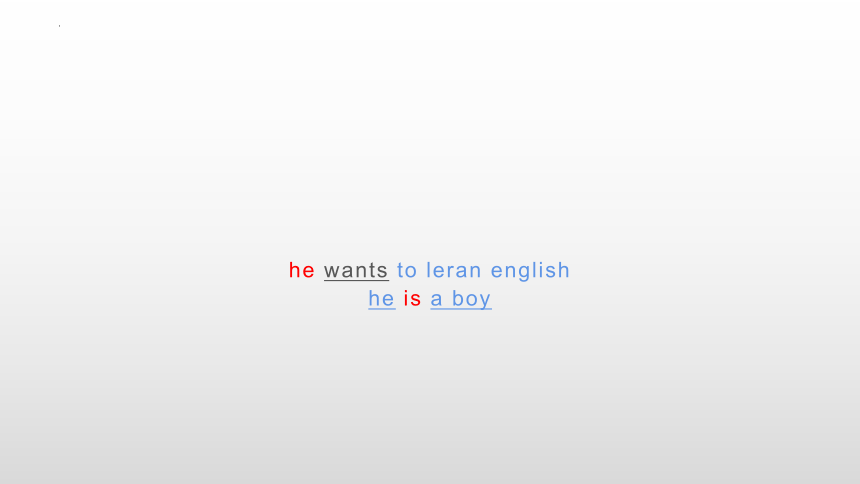
|
|
| 格式 | pptx | ||
| 文件大小 | 122.4KB | ||
| 资源类型 | 教案 | ||
| 版本资源 | 通用版 | ||
| 科目 | 英语 | ||
| 更新时间 | 2022-04-02 00:00:00 | ||
图片预览

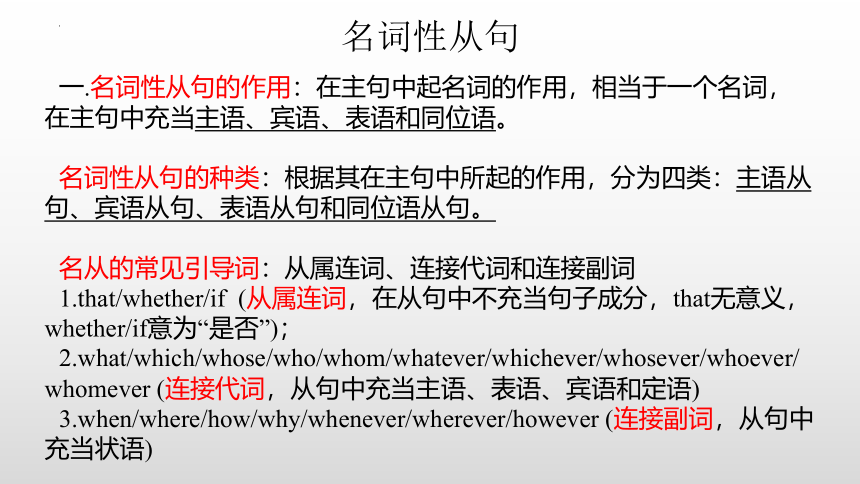
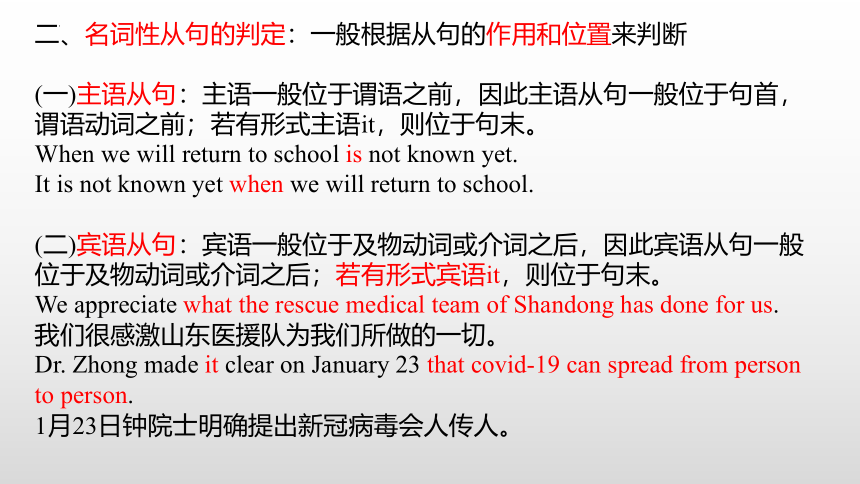
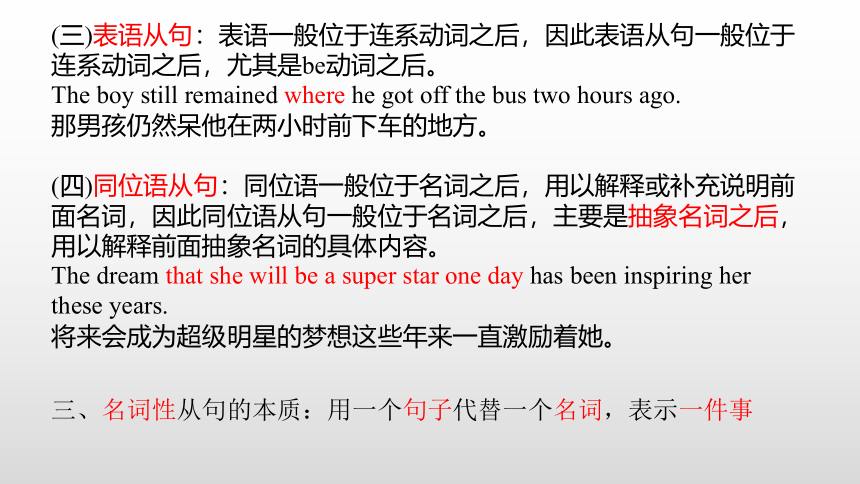
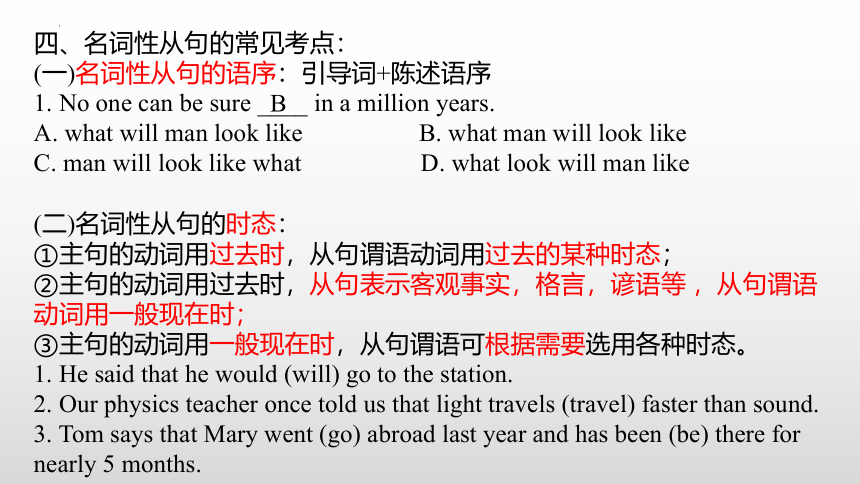
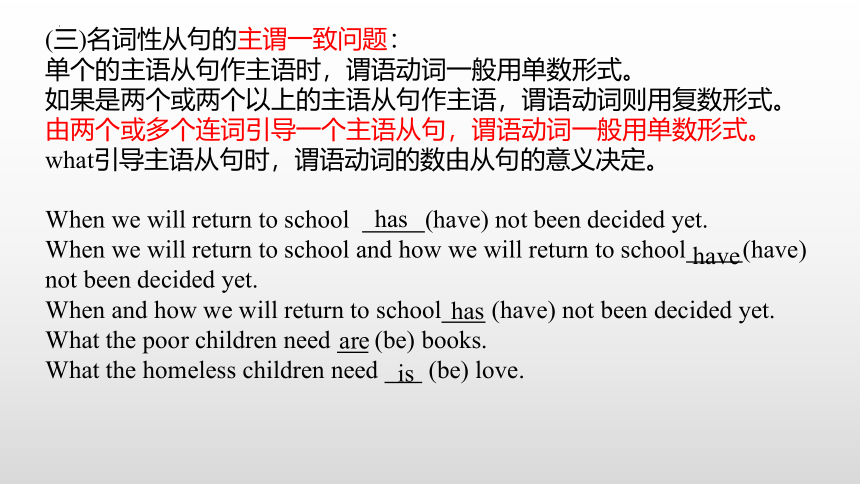
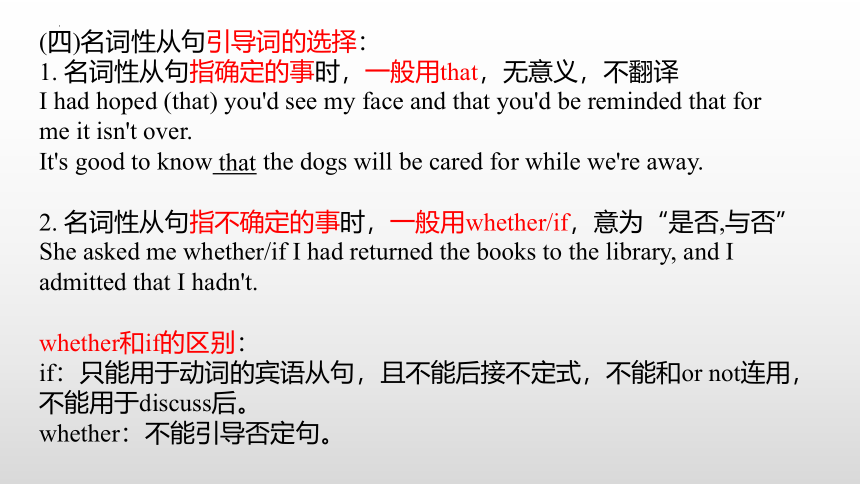
文档简介
(共18张PPT)
he wants to leran english
he is a boy
名词性从句
一.名词性从句的作用:在主句中起名词的作用,相当于一个名词,在主句中充当主语、宾语、表语和同位语。
名词性从句的种类:根据其在主句中所起的作用,分为四类:主语从句、宾语从句、表语从句和同位语从句。
名从的常见引导词:从属连词、连接代词和连接副词
1.that/whether/if (从属连词,在从句中不充当句子成分,that无意义,whether/if意为“是否”);
2.what/which/whose/who/whom/whatever/whichever/whosever/whoever/whomever (连接代词,从句中充当主语、表语、宾语和定语)
3.when/where/how/why/whenever/wherever/however (连接副词,从句中充当状语)
二、名词性从句的判定:一般根据从句的作用和位置来判断
(一)主语从句:主语一般位于谓语之前,因此主语从句一般位于句首,谓语动词之前;若有形式主语it,则位于句末。
When we will return to school is not known yet.
It is not known yet when we will return to school.
(二)宾语从句:宾语一般位于及物动词或介词之后,因此宾语从句一般位于及物动词或介词之后;若有形式宾语it,则位于句末。
We appreciate what the rescue medical team of Shandong has done for us.
我们很感激山东医援队为我们所做的一切。
Dr. Zhong made it clear on January 23 that covid-19 can spread from person to person.
1月23日钟院士明确提出新冠病毒会人传人。
(三)表语从句:表语一般位于连系动词之后,因此表语从句一般位于连系动词之后,尤其是be动词之后。
The boy still remained where he got off the bus two hours ago.
那男孩仍然呆他在两小时前下车的地方。
(四)同位语从句:同位语一般位于名词之后,用以解释或补充说明前面名词,因此同位语从句一般位于名词之后,主要是抽象名词之后,用以解释前面抽象名词的具体内容。
The dream that she will be a super star one day has been inspiring her these years.
将来会成为超级明星的梦想这些年来一直激励着她。
三、名词性从句的本质:用一个句子代替一个名词,表示一件事
四、名词性从句的常见考点:
(一)名词性从句的语序:引导词+陈述语序
1. No one can be sure ____ in a million years.
A. what will man look like B. what man will look like
C. man will look like what D. what look will man like
(二)名词性从句的时态:
①主句的动词用过去时,从句谓语动词用过去的某种时态;
②主句的动词用过去时,从句表示客观事实,格言,谚语等 ,从句谓语动词用一般现在时;
③主句的动词用一般现在时,从句谓语可根据需要选用各种时态。
1. He said that he would (will) go to the station.
2. Our physics teacher once told us that light travels (travel) faster than sound.
3. Tom says that Mary went (go) abroad last year and has been (be) there for nearly 5 months.
B
(三)名词性从句的主谓一致问题:
单个的主语从句作主语时,谓语动词一般用单数形式。
如果是两个或两个以上的主语从句作主语,谓语动词则用复数形式。由两个或多个连词引导一个主语从句,谓语动词一般用单数形式。what引导主语从句时,谓语动词的数由从句的意义决定。
When we will return to school (have) not been decided yet.
When we will return to school and how we will return to school (have) not been decided yet.
When and how we will return to school (have) not been decided yet.
What the poor children need (be) books.
What the homeless children need (be) love.
has
have
has
are
is
(四)名词性从句引导词的选择:
1. 名词性从句指确定的事时,一般用that,无意义,不翻译
I had hoped (that) you'd see my face and that you'd be reminded that for me it isn't over.
It's good to know the dogs will be cared for while we're away.
2. 名词性从句指不确定的事时,一般用whether/if,意为“是否,与否”
She asked me whether/if I had returned the books to the library, and I admitted that I hadn't.
whether和if的区别:
if:只能用于动词的宾语从句,且不能后接不定式,不能和or not连用,不能用于discuss后。
whether:不能引导否定句。
that
3. 名词性从句指问题时,一般用连接代词what/which/who/whom或连接副词when/where/ how / why等。
【注意】当从句部分缺名词时,用连接代词;当从句部分不缺名词的时候,用连接副词。what一般指物,who(m)一般指人,which可指人或物,一般有范围选择。
① We haven’t discussed yet ______ we are going to place our new furniture.
A. that B. which C. what D. where
② You are saying that everyone should be equal, and this is ______ I disagree.
A. why B. where C. what D. how
③ —What did your parents think about your decision
—They always let me do ______ I think I should do.
A. when B. that C. how D. what
⑤—Do you know Miss Zhu's address is
—She may live at No. 3 or No. 4 of Xianxing road. I'm not sure of .
D
B
D
what
which
4. 连接代词which/what/whose可充当定语,后接名词,构成复合引导词,置于从句最前面。
① Can you tell me cake you want
你能告诉我你想要哪个蛋糕吗?
③ I don't know dog she is walking
我不知道她在遛谁家的狗。
5. how可以在从句中“修饰”形容词或副词,构成复合引导词 how old/often/long/soon/much…等,置于从句最前面。
① Do you know old she is
你知道她多大吗?
which
whose
how
6. whoever/whomever/whichever/whatever 也可以引导名词性从句,翻译为“...的任何...”,往往可以转换成相应的定语从句(whoever=anyone who;whatever=everything/anything that)。
① 任何犯法的人都要受到惩罚。
breaks the law will be punished.
breaks the law will be punished.
7. because也可引导表语从句,只可用于以下句型:This/That/It is because...
8. as if/ as though引导表语从句,从句中可能会用虚拟语气。
It seems we will have to study online at home for another month.
看起来似乎我们还得在家网上学习一个月。
Whoever
Anyone who
as if/though
五、名词性从句的难点问题:
1. it作形式主语
当主语从句较长,而谓语较短时,常常将从句后置,而用it作为形式主语置于句首。
常见的形式主语句型:
① It is +名词+主语从句 (常见n.:a fact/shame/pity/wonder, an honor, no surprise/wonder, …)
② It is +形容词+主语从句(常见adj.:necessary/ strange/ important/ possible/ likely/obvious/clear…)
③ It is +过去分词+that从句(常见P.P.:said/ thought/ reported/ believed/ suggested/ announced…)
④ It +动词(+宾语或状语)+主语从句(常见v.:seem/appear/turn out/ occur/ happen/hit sb/strike sb…)
1. It is known to us all that the 2008 Olympic Games took place in Beijing.
2. As is known to us all, the 2008 Olympic Games took place in Beijing.
3. It is obvious/clear that you have made a big mistake.
4. It is suggested that the meeting (should) be put off.
5. It occurred to me that I hadn’t done my English homework.
2. it作形式宾语
以下句型中常用it 作形式宾语:
① 动词+ it + 宾补 (adj./adv./n.) + 从句
② enjoy/love/like/hate/appreciate…+ it + (when/if) 从句
③ 动词+介词+ it + (that) 从句
I think it worthwhile that we spent so much money on these books.
I would appreciate it if you can come to our party.
You may depend/rely on it that she will finish the task in time.
3. whatever/whichever/whoever/whomever/whenever/wherever/however可引导让步状语从句,可替换为no matter what/ which/ who/ whom/ when/ where/ how, 不可与其引导的名词性从句相混淆。
Wherever you go and whatever you do, I’ll be right here waiting for you.
4. 名词性从句中的虚拟语气
① 主语从句中的虚拟语气基本句型:
It is +形容词/名词/过去分词+ that ... + (should) do
a. It is important (necessary, natural, strange, …) + that... + (should) do
b. It is a pity (a shame, no wonder…) + that... + (should) do
c. It is suggested (required, demanded, insisted …) + that ... + (should) do
② 宾语从句中的虚拟语气基本句型:
a. suggest/ advise/ propose/ demand/ require/ insist/ request/ command/…
+ that... + (should) do
b. wish/would rather +(that)+ 过去时态
③ 表语和宾语从句中的虚拟语气:
在 suggestion, proposal, idea, plan, order, advice 等名词后面的表语从句、同位语从句中要用虚拟语气,即(should) + do/be done.
1. It is strange that he (fail) the exam.
2. We suggested that the meeting (put off) .
3. His suggestion is that you (try) once more sounds reasonable.
4. The order given by the commander was that they (stop)
until he allowed them to.
六、名词性从句的解题技巧:
1. 判定名词性从句
2. 从句缺名词:用“连代”(注意:90%是what);从句不缺名词:用“连词”
或“连副”;
3. 确定的事:用that;表“是否/与否”或跟or/or not搭配:用whether/if
4. 最终确定答案:意义才是最重要的。
(should) fail
(should) be put off
(should) try
(should) not stop
Ⅱ.语法填空
1.It doesn’t matter whether you turn right or left at the crossing—
both roads lead to the park.
2.Jerry did not regret giving the comment but felt that he could
have expressed it differently.
3.I’m afraid he’s more of a talker than a doer,which is why he
never finishes anything.
4.—Does it matter much if the manager won’t attend the meeting
here tomorrow
—I have no idea.
5.When you feel down,a warm hug with a smile is just what you need
to cheer you up.
6.It is said that the famous football star is willing to play for
whoever would pay him three million dollars a year.
7.—Can we finish our task by the weekend
—It all depends on whether we can get Mr.Smith’s cooperation.
8.Before the sales start,I make a list of what my kids will need
for the coming season.
9.As a new graduate, he doesn’t know what it takes to start a
business here.
10.—Have you finished the book
—No, I’ve read up to where the children discover the secret
cave.
he wants to leran english
he is a boy
名词性从句
一.名词性从句的作用:在主句中起名词的作用,相当于一个名词,在主句中充当主语、宾语、表语和同位语。
名词性从句的种类:根据其在主句中所起的作用,分为四类:主语从句、宾语从句、表语从句和同位语从句。
名从的常见引导词:从属连词、连接代词和连接副词
1.that/whether/if (从属连词,在从句中不充当句子成分,that无意义,whether/if意为“是否”);
2.what/which/whose/who/whom/whatever/whichever/whosever/whoever/whomever (连接代词,从句中充当主语、表语、宾语和定语)
3.when/where/how/why/whenever/wherever/however (连接副词,从句中充当状语)
二、名词性从句的判定:一般根据从句的作用和位置来判断
(一)主语从句:主语一般位于谓语之前,因此主语从句一般位于句首,谓语动词之前;若有形式主语it,则位于句末。
When we will return to school is not known yet.
It is not known yet when we will return to school.
(二)宾语从句:宾语一般位于及物动词或介词之后,因此宾语从句一般位于及物动词或介词之后;若有形式宾语it,则位于句末。
We appreciate what the rescue medical team of Shandong has done for us.
我们很感激山东医援队为我们所做的一切。
Dr. Zhong made it clear on January 23 that covid-19 can spread from person to person.
1月23日钟院士明确提出新冠病毒会人传人。
(三)表语从句:表语一般位于连系动词之后,因此表语从句一般位于连系动词之后,尤其是be动词之后。
The boy still remained where he got off the bus two hours ago.
那男孩仍然呆他在两小时前下车的地方。
(四)同位语从句:同位语一般位于名词之后,用以解释或补充说明前面名词,因此同位语从句一般位于名词之后,主要是抽象名词之后,用以解释前面抽象名词的具体内容。
The dream that she will be a super star one day has been inspiring her these years.
将来会成为超级明星的梦想这些年来一直激励着她。
三、名词性从句的本质:用一个句子代替一个名词,表示一件事
四、名词性从句的常见考点:
(一)名词性从句的语序:引导词+陈述语序
1. No one can be sure ____ in a million years.
A. what will man look like B. what man will look like
C. man will look like what D. what look will man like
(二)名词性从句的时态:
①主句的动词用过去时,从句谓语动词用过去的某种时态;
②主句的动词用过去时,从句表示客观事实,格言,谚语等 ,从句谓语动词用一般现在时;
③主句的动词用一般现在时,从句谓语可根据需要选用各种时态。
1. He said that he would (will) go to the station.
2. Our physics teacher once told us that light travels (travel) faster than sound.
3. Tom says that Mary went (go) abroad last year and has been (be) there for nearly 5 months.
B
(三)名词性从句的主谓一致问题:
单个的主语从句作主语时,谓语动词一般用单数形式。
如果是两个或两个以上的主语从句作主语,谓语动词则用复数形式。由两个或多个连词引导一个主语从句,谓语动词一般用单数形式。what引导主语从句时,谓语动词的数由从句的意义决定。
When we will return to school (have) not been decided yet.
When we will return to school and how we will return to school (have) not been decided yet.
When and how we will return to school (have) not been decided yet.
What the poor children need (be) books.
What the homeless children need (be) love.
has
have
has
are
is
(四)名词性从句引导词的选择:
1. 名词性从句指确定的事时,一般用that,无意义,不翻译
I had hoped (that) you'd see my face and that you'd be reminded that for me it isn't over.
It's good to know the dogs will be cared for while we're away.
2. 名词性从句指不确定的事时,一般用whether/if,意为“是否,与否”
She asked me whether/if I had returned the books to the library, and I admitted that I hadn't.
whether和if的区别:
if:只能用于动词的宾语从句,且不能后接不定式,不能和or not连用,不能用于discuss后。
whether:不能引导否定句。
that
3. 名词性从句指问题时,一般用连接代词what/which/who/whom或连接副词when/where/ how / why等。
【注意】当从句部分缺名词时,用连接代词;当从句部分不缺名词的时候,用连接副词。what一般指物,who(m)一般指人,which可指人或物,一般有范围选择。
① We haven’t discussed yet ______ we are going to place our new furniture.
A. that B. which C. what D. where
② You are saying that everyone should be equal, and this is ______ I disagree.
A. why B. where C. what D. how
③ —What did your parents think about your decision
—They always let me do ______ I think I should do.
A. when B. that C. how D. what
⑤—Do you know Miss Zhu's address is
—She may live at No. 3 or No. 4 of Xianxing road. I'm not sure of .
D
B
D
what
which
4. 连接代词which/what/whose可充当定语,后接名词,构成复合引导词,置于从句最前面。
① Can you tell me cake you want
你能告诉我你想要哪个蛋糕吗?
③ I don't know dog she is walking
我不知道她在遛谁家的狗。
5. how可以在从句中“修饰”形容词或副词,构成复合引导词 how old/often/long/soon/much…等,置于从句最前面。
① Do you know old she is
你知道她多大吗?
which
whose
how
6. whoever/whomever/whichever/whatever 也可以引导名词性从句,翻译为“...的任何...”,往往可以转换成相应的定语从句(whoever=anyone who;whatever=everything/anything that)。
① 任何犯法的人都要受到惩罚。
breaks the law will be punished.
breaks the law will be punished.
7. because也可引导表语从句,只可用于以下句型:This/That/It is because...
8. as if/ as though引导表语从句,从句中可能会用虚拟语气。
It seems we will have to study online at home for another month.
看起来似乎我们还得在家网上学习一个月。
Whoever
Anyone who
as if/though
五、名词性从句的难点问题:
1. it作形式主语
当主语从句较长,而谓语较短时,常常将从句后置,而用it作为形式主语置于句首。
常见的形式主语句型:
① It is +名词+主语从句 (常见n.:a fact/shame/pity/wonder, an honor, no surprise/wonder, …)
② It is +形容词+主语从句(常见adj.:necessary/ strange/ important/ possible/ likely/obvious/clear…)
③ It is +过去分词+that从句(常见P.P.:said/ thought/ reported/ believed/ suggested/ announced…)
④ It +动词(+宾语或状语)+主语从句(常见v.:seem/appear/turn out/ occur/ happen/hit sb/strike sb…)
1. It is known to us all that the 2008 Olympic Games took place in Beijing.
2. As is known to us all, the 2008 Olympic Games took place in Beijing.
3. It is obvious/clear that you have made a big mistake.
4. It is suggested that the meeting (should) be put off.
5. It occurred to me that I hadn’t done my English homework.
2. it作形式宾语
以下句型中常用it 作形式宾语:
① 动词+ it + 宾补 (adj./adv./n.) + 从句
② enjoy/love/like/hate/appreciate…+ it + (when/if) 从句
③ 动词+介词+ it + (that) 从句
I think it worthwhile that we spent so much money on these books.
I would appreciate it if you can come to our party.
You may depend/rely on it that she will finish the task in time.
3. whatever/whichever/whoever/whomever/whenever/wherever/however可引导让步状语从句,可替换为no matter what/ which/ who/ whom/ when/ where/ how, 不可与其引导的名词性从句相混淆。
Wherever you go and whatever you do, I’ll be right here waiting for you.
4. 名词性从句中的虚拟语气
① 主语从句中的虚拟语气基本句型:
It is +形容词/名词/过去分词+ that ... + (should) do
a. It is important (necessary, natural, strange, …) + that... + (should) do
b. It is a pity (a shame, no wonder…) + that... + (should) do
c. It is suggested (required, demanded, insisted …) + that ... + (should) do
② 宾语从句中的虚拟语气基本句型:
a. suggest/ advise/ propose/ demand/ require/ insist/ request/ command/…
+ that... + (should) do
b. wish/would rather +(that)+ 过去时态
③ 表语和宾语从句中的虚拟语气:
在 suggestion, proposal, idea, plan, order, advice 等名词后面的表语从句、同位语从句中要用虚拟语气,即(should) + do/be done.
1. It is strange that he (fail) the exam.
2. We suggested that the meeting (put off) .
3. His suggestion is that you (try) once more sounds reasonable.
4. The order given by the commander was that they (stop)
until he allowed them to.
六、名词性从句的解题技巧:
1. 判定名词性从句
2. 从句缺名词:用“连代”(注意:90%是what);从句不缺名词:用“连词”
或“连副”;
3. 确定的事:用that;表“是否/与否”或跟or/or not搭配:用whether/if
4. 最终确定答案:意义才是最重要的。
(should) fail
(should) be put off
(should) try
(should) not stop
Ⅱ.语法填空
1.It doesn’t matter whether you turn right or left at the crossing—
both roads lead to the park.
2.Jerry did not regret giving the comment but felt that he could
have expressed it differently.
3.I’m afraid he’s more of a talker than a doer,which is why he
never finishes anything.
4.—Does it matter much if the manager won’t attend the meeting
here tomorrow
—I have no idea.
5.When you feel down,a warm hug with a smile is just what you need
to cheer you up.
6.It is said that the famous football star is willing to play for
whoever would pay him three million dollars a year.
7.—Can we finish our task by the weekend
—It all depends on whether we can get Mr.Smith’s cooperation.
8.Before the sales start,I make a list of what my kids will need
for the coming season.
9.As a new graduate, he doesn’t know what it takes to start a
business here.
10.—Have you finished the book
—No, I’ve read up to where the children discover the secret
cave.
